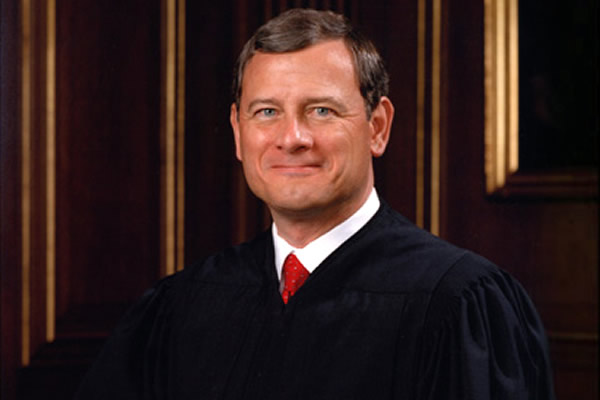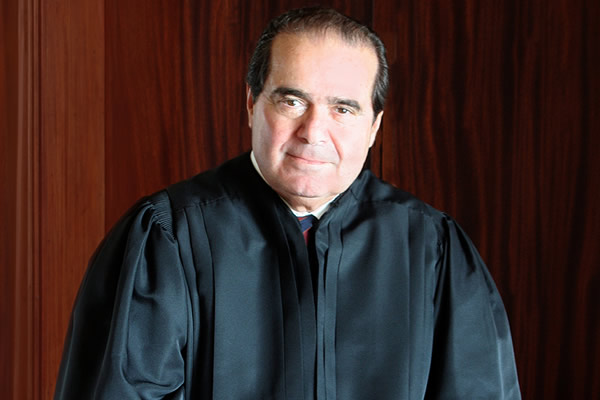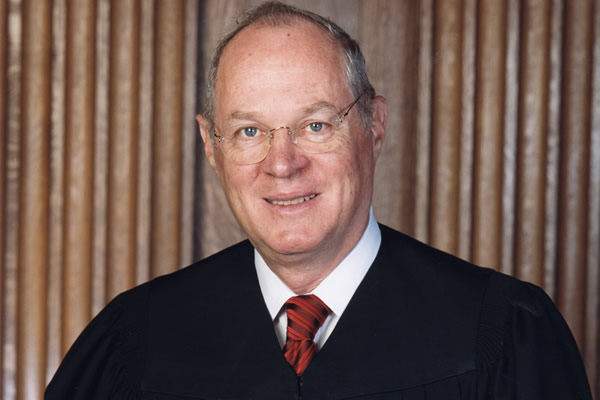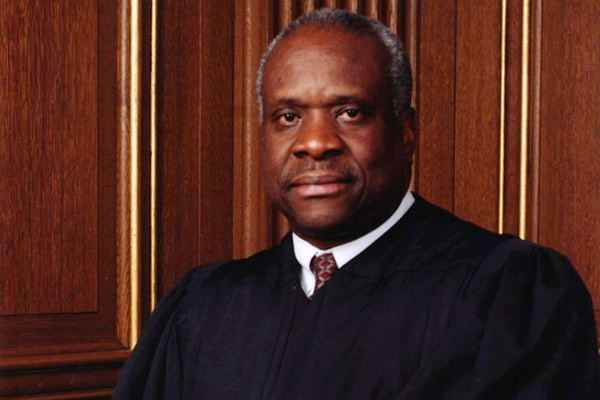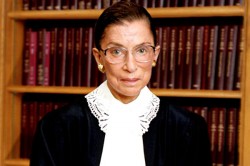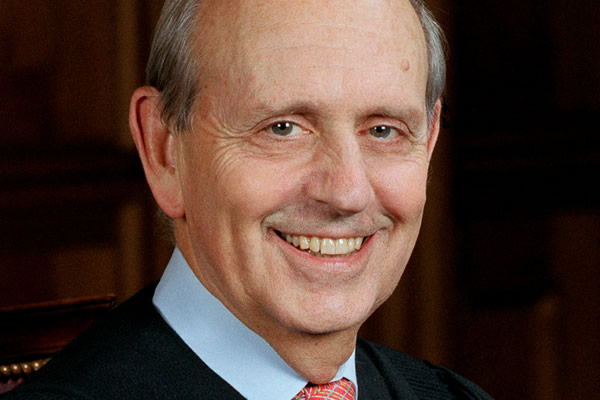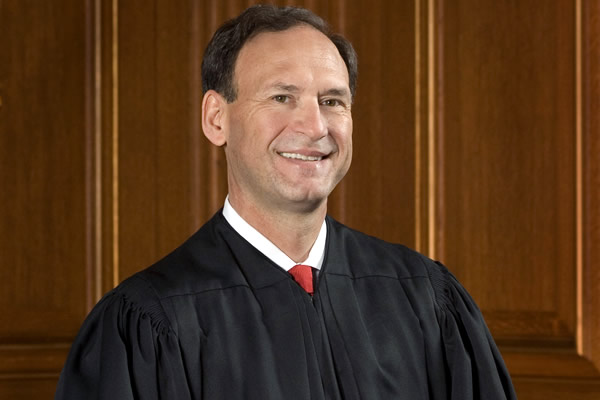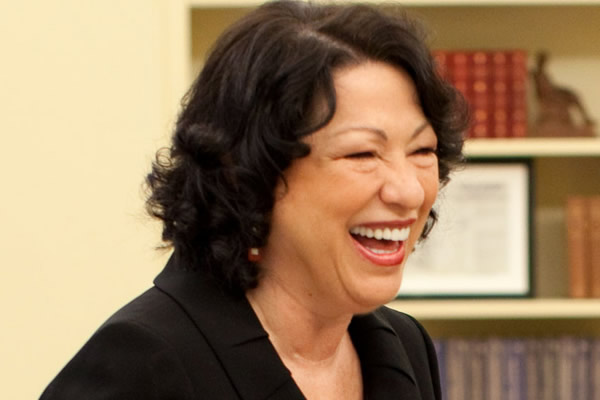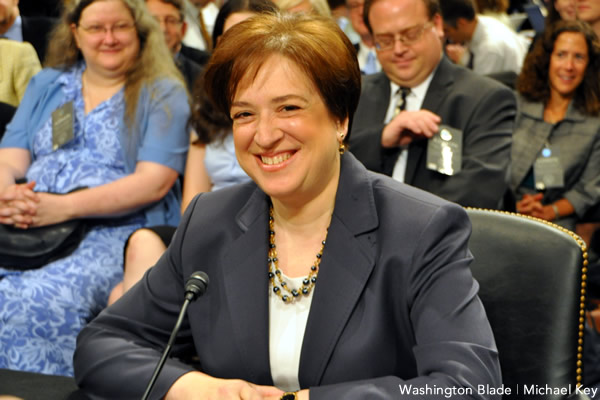National
How will Supreme Court rule on marriage?
Parsing statements, records for hints as to how justices will decide DOMA, Prop 8 cases
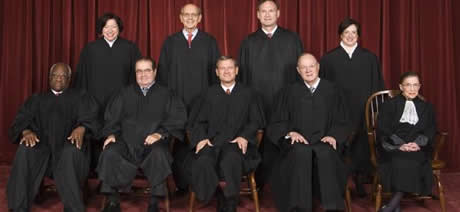
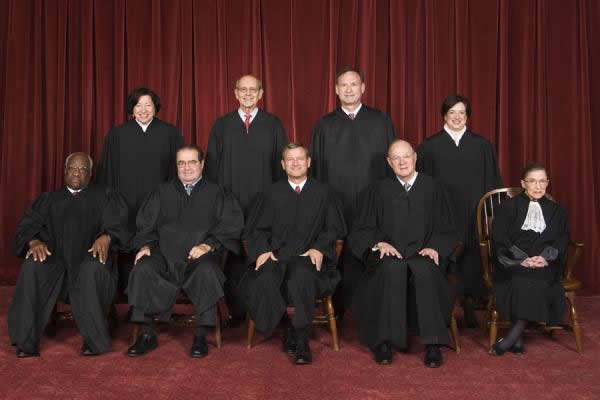
Justices on the U.S. Supreme Court are expected to issue rulings on the Prop 8 and DOMA cases in June. (Photo public domain)
The nine members of the U.S. Supreme Court are expected to reach a decision by the end of June in two high-profile LGBT rights cases on which they heard oral arguments last week challenging California’s Proposition 8 and the federal Defense of Marriage Act.
The justices could reach any number of decisions on either or both of the cases — upholding the anti-gay measures, dismissing the cases for lack of standing or jurisdiction, striking down Prop 8 and DOMA on grounds they violate the rights of same-sex couples under the U.S. Constitution — or even issuing a national ruling in favor of marriage equality.
Predicting how they might rule is tricky. But several of the justices made statements and asked questions during the oral arguments that offered some hints. Perhaps more significantly, many of them have a record of ruling in gay rights cases that might indicate their leanings on marriage. The Washington Blade has compiled profiles of the justices to assess how they might rule in the two marriage cases before them.
In addition to examining their comments during the arguments, the Blade has looked at how they ruled in other high-profile gay rights cases. One is the 1996 case of Romer v. Evans in which the Supreme Court struck down Colorado’s Amendment 2, which would have prohibited municipalities from passing non-discrimination ordinances protecting LGBT people. Another is the 2003 case of Lawrence v. Texas in which the Supreme Court struck down state sodomy laws.
The Blade also looked at the court ruling in the 2010 case of Christian Legal Society v. Martinez. In that case, the court upheld the Hastings College of Law’s non-discrimination policy against a challenge from Hastings Christian Fellowship, which sought to overturn the policy to maintain its status as an official school group while prohibiting LGBT people from holding positions as officers.
1. Chief Justice John Roberts
The chief justice of the Supreme Court seemed skeptical during oral arguments that Prop 8 and DOMA should be struck down as unconstitutional. He also seemed dismissive of the notion that LGBT people lack political power.
In an exchange with attorney Robbie Kaplan, Chief Justice John Roberts disputed that gay people lack political power — a characteristic that the court has considered in weighing whether a group should be considered a suspect class.
“As far as I can tell, political figures are falling over themselves to endorse your side of the case,” Roberts said.
The chief justice was likely referring to the trend of U.S. senators announcing their support for marriage equality, which just this week added Sens. Bob Casey (D-Pa.), Tom Carper (D-Del.) and Mark Kirk (R-Ill.). When Kaplan pointed out that no group has been subject to referenda in recent years like gay people, Roberts seemed unmoved.
“You just referred to a sea change in people’s understandings and values from 1996, when DOMA was enacted, and I’m just trying to see where that comes from, if not from the political effectiveness of groups on your side,” Roberts said.
Roberts, who was appointed by President George W. Bush, hasn’t ruled on many gay rights cases during his time on the bench. Still, Roberts ruled as part of the dissent that deemed exclusion of LGBT students was acceptable in the Christian Legal Society case.
On the other hand, Roberts in 1996 helped gay rights activists as part of his law firm’s pro bono work in preparation for the Romer case. He also has a lesbian cousin, Jean Podrasky, who attended arguments on Prop 8.
Suzanne Goldberg, a lesbian and co-director of Columbia University’s Center for Gender & Sexuality Law, pointed to another comment Roberts made indicating a parent forcing a child to make friends with another child changes the definition of friendship.
“It suggested that he might be less open to recognizing marriage rights for same-sex couples than the Olson-Boies team had anticipated,” Goldberg said.
2. Associate Justice Antonin Scalia
Associate Justice Antonin Scalia, viewed by many as the most anti-gay of the justices, mused that being raised by gay parents may not be good for a child — an argument made by many anti-gay groups.
“If you redefine marriage to include same-sex couples, you must permit adoption by same-sex couples, and there’s considerable disagreement among sociologists as to what the consequences of raising a child in a single-sex family, whether that is harmful to the child or not,” Scalia said. “Some states do not permit adoption by same-sex couples for that reason.”
Those words are consistent with anti-gay views that Scalia has expressed in the past. Most notably, speaking at Princeton in December, Scalia compared bans on sodomy to laws against murder, saying, “If we cannot have moral feelings against homosexuality, can we have it against murder? Can we have it against other things?”
Since his confirmation to the court, Scalia has not only made anti-gay rulings, but has taken the lead on the opinions. The Reagan-appointed justice wrote the dissenting opinions in the Romer and Lawrence cases and joined with other dissenting justices in ruling for LGBT exclusion in the Christian Legal Society case.
Doug NeJaime, who’s gay and a professor at Loyola Law School, said Scalia is likely to rule to uphold Prop 8 and the Defense of Marriage Act.
“Justice Scalia has made clear in earlier opinions … that legislation can be justified merely by moral disapproval of homosexuality, even though a majority of the court has rejected that position,” NeJaime said. “Moreover, under his theory of constitutional interpretation, he does not believe that lesbians and gay men have a constitutional basis for their claims in these cases.”
3. Associate Justice Anthony Kennedy
The justice who’s being most closely watched because of his reputation for being a swing vote — and his previous rulings in favor of gay rights — conveyed mixed sentiments during the arguments.
Associate Justice Anthony Kennedy contemplated the effect that overturning or sustaining Prop 8 would have on children based on the newness of same-sex marriage.
“We have five years of information to weigh against 2,000 years of history or more,” Kennedy said. “On the other hand, there is … what could be a legal injury, and that’s the voice of these children. There are some 40,000 children in California … that live with same-sex parents, and they want their parents to have full recognition and full status.”
A Reagan appointee, Kennedy authored the majority opinions in the Romer and Lawrence cases that struck down anti-gay measures in those lawsuits. In the Christian Legal Society case, Kennedy also ruled in favor of requiring student groups to be open to all students regardless of LGBT status.
That’s what makes Kennedy’s comment questioning the Ninth Circuit ruling against Prop 8, which was largely based on his opinion in Romer, particularly noteworthy.
“The rationale of the Ninth Circuit was much more narrow,” Kennedy said. “It basically said that California, which has been more generous, more open to protecting same-sex couples than almost any state in the union, just didn’t go far enough, and it’s being penalized for not going far enough. That’s a very odd rationale on which to sustain this opinion.”
Nan Hunter, a lesbian law professor at Georgetown University, said the “single most powerful vibe” she received from Kennedy during arguments was his ambivalence.
“My best guess is that in the Perry case, he will rule in some way that avoids discussion of Prop 8’s constitutionality and that in the Windsor case, he will conclude that DOMA is unconstitutional, but his opinion may invoke federalism as much as it does the Equal Protection Clause,” Hunter said.
4. Associate Justice Clarence Thomas
In accordance with his custom, Associate Justice Clarence Thomas remained silent for the duration of oral arguments in the marriage cases.
Thomas is known for not asking questions. In January, after seven years of silence, the George H.W. Bush-appointed justice made news when he broke his tradition and cracked a joke about the competency of an attorney during a case unrelated to marriage.
But Thomas has a history of taking the anti-gay side. He ruled in the dissent in the Romer and Lawrence cases and ruled for LGBT exclusion in the Christian Legal Society case.
Chris Stoll, a senior staff attorney for the National Center for Lesbian Rights, said oral arguments don’t offer any information on how Thomas might rule, but noted the justice’s history of anti-gay opinions.
“He is quite conservative and historically has voted with the other conservative justices in cases involving LGBT equality,” Stoll said.
5. Associate Justice Ruth Bader Ginsburg
One justice who has a history of ruling in favor of gay rights indicated a disdain for DOMA during oral arguments.
Associate Justice Ruth Bader Ginsburg said the 1996 law creates two different kinds of unions for same-sex and opposite-sex couples: “the full marriage, and then this sort of skim milk marriage.”
While questioning attorney Paul Clement, Ginsburg more distinctly articulated the problems for gay couples under DOMA by enumerating benefits denied to them under the law.
“The problem is if we are totally for the states’ decision that there is a marriage between two people, for the federal government then to come in to say no joint return, no marital deduction, no Social Security benefits; your spouse is very sick but you can’t get leave; people — if that set of attributes, one might well ask, what kind of marriage is this?” Ginsburg said.
Ginsburg also has a history suggesting she’d be willing to rule against Prop 8 and DOMA. The Clinton-appointed justice ruled in favor of LGBT advocates in the Romer, Lawrence and Christian Legal Society cases. Prior to her confirmation as a Supreme Court justice, Ginsburg was a women’s rights advocate and co-founder of the women’s rights project at the American Civil Liberties Union.
David Gans, civil rights director for the progressive Constitutional Accountability Center, said he considers Ginsburg a likely vote to strike down DOMA and Prop 8 based on her history of rulings and comments made in court.
“I think her comments tended to be across the board very skeptical of the justifications offered, and, of course, her record, both as an advocate and justice is to honor the constitutional guarantee of equal protection applies to all persons,” Gans said.
6. Associate Justice Stephen Breyer
The other Clinton appointee on the bench also made comments during the Prop 8 arguments suggesting he might rule in favor of marriage rights for gay couples.
Associate Justice Stephen Breyer was dismissive of Cooper’s assertion that marriage is for procreation, observing California allows straight couples who cannot have children to marry.
“What precisely is the way in which allowing gay couples to marry would interfere with the vision of marriage as procreation of children that allowing sterile couples of different sexes to marry would not?” Breyer said. “I mean, there are lots of people who get married who can’t have children.”
And Breyer’s earlier rulings suggest he would be amenable to striking down Prop 8 and DOMA. Breyer joined Kennedy and other justices in the pro-gay rulings for Romer and Lawrence and sided with LGBT inclusion in the Christian Legal Society Case.
Gans said Breyer’s comments during the Prop 8 arguments indicate his rulings on the anti-gay measures will likely be consistent with his earlier decisions.
“Justice Breyer’s questions during oral argument suggested that he would find that discriminatory marriage laws violate the constitutional guarantee of equal protection for all persons,” Gans said.
7. Associate Justice Samuel Alito
Associate Justice Samuel Alito expressed concerns about same-sex marriage, quipping that it’s “newer than cell phones or the Internet.”
“Same-sex marriage is very new,” Alito said. “I think it was first adopted in the Netherlands in 2000. So there isn’t a lot of data about its effect. And it may turn out to be a good thing; it may turn out not to be a good thing, as the supporters of Proposition 8 apparently believe.”
An appointee of President George W. Bush, Alito hasn’t been on the court long enough to have ruled in the earlier landmark Lawrence and Romer cases. But he wrote the dissenting opinion in favor of LGBT exclusion in the Christian Legal Society case.
Lavi Soloway, a gay immigration attorney and co-founder of The DOMA Project, said he expects Alito to be consistent and issue an anti-gay decision in the cases before him — taking note of the exchange in the Prop 8 case.
“This line of thinking was disappointing; it not only belittled the fight for equality, but suggested that Justice Alito would first need to be convinced of the ‘effects’ of same-sex marriage before he could determine whether gay and lesbian Americans have a constitutionally protected right to marry,” Soloway said. “This exchange suggested to me that Alito will most likely vote to uphold Prop 8, preferring that legislatures continue to wrestle with this issue.”
8. Associate Justice Sonia Sotomayor
Another justice — this one appointed by President Obama — asked some of the most pointed questions about whether there’s any reason anti-gay laws could survive the court’s lowest standard of review.
Associate Justice Sonia Sotomayor pressed attorney Charles Cooper on whether he could conceive of anti-gay laws on other issues other than marriage that could survive rational basis review. The answer from Cooper was that he could not.
“If that is true, then why aren’t they a class?” Sotomayor responded. “If they’re a class that makes any other discrimination improper, irrational, then why aren’t we treating them as a class for this one thing?”
Sotomayor’s response suggests she might agree with the Obama administration that laws related to sexual orientation should be subjected to heightened scrutiny, or a greater assumption they’re unconstitutional.
A newcomer to the court, Sotomayor hasn’t had the opportunity to rule on many of the earlier LGBT rights cases that have come before the bench. But in the Christian Legal Society case, she joined four other justices in ruling student groups had to accept all students regardless of LGBT status.
Notably, Sotomayor was the only one among nine justices who responded to a letter from a North Carolina 6th grader named Cameron urging justices to rule in favor of marriage equality. The justice said she had no comment on the marriage cases, but urged Cameron to keep “dreaming big.”
NCLR’s Stoll pointed to Sotomayor’s exchange with Cooper as evidence she’d rule against Prop 8 and had similar expectations for how she’d rule on DOMA.
“She seemed perplexed and unpersuaded by Cooper’s argument that excluding gay people from marriage somehow promotes ‘responsible procreation’ by different-sex couples,” Stoll said.
9. Associate Justice Elena Kagan
Yet another justice appointed by President Obama seemed skeptical about arguments presented by proponents of Prop 8 and DOMA.
Associate Justice Elena Kagan suggested to attorney Paul Clement that Congress may have had another motive other than uniformity when it determined to pass the anti-gay law.
“This was a real difference in the uniformity that the federal government was pursuing,” Kagan said. “And it suggests that maybe something — maybe Congress had something different in mind than uniformity.”
Clement offered a lengthy response in which he talked about federal bans on polygamy and laws after the Civil War allowing freed slaves to marry. But Kagan responded by reading from the House report on DOMA, which states the law was passed “to reflect an honor of collective moral judgment and to express moral disapproval of homosexuality” — deemed a “gotcha” moment that elicited laughter from those in the courtroom.
During the Prop 8 arguments, Kagan was also skeptical of Cooper’s argument that the purpose of marriage is procreation and asked for a legitimate reason for excluding same-sex couples from marriage.
“Is there any reason that you have for excluding them?” Kagan said. “In other words, you’re saying, well, if we allow same-sex couples to marry, it doesn’t serve the state’s interest. But do you go further and say that it harms any state interest?”
Like Sotomayor, Kagan is a relative newcomer to the court and hasn’t had the opportunity to rule on gay cases. During her confirmation hearing, Kagan wouldn’t say whether the she thinks the U.S. Constitution guarantees same-sex couples the right to marry.
Still, Loyola’s NeJaime said Kagan seemed bothered during oral arguments by equal protections concerns presented by Prop 8 and DOMA.
“Given her lengthy questions about the relationship between age and procreative ability, she seems unconvinced by the ‘responsible procreation’ rationale for same-sex marriage bans,” NeJaime said. “And given her reading of the House report on DOMA regarding the ‘moral disapproval of homosexuality,’ she is suggesting that the law may not survive rational basis review.”
Pennsylvania
Malcolm Kenyatta could become the first LGBTQ statewide elected official in Pa.
State lawmaker a prominent Biden-Harris 2024 reelection campaign surrogate

Following his win in the Democratic primary contest on Wednesday, Pennsylvania state Rep. Malcolm Kenyatta, who is running for auditor general, is positioned to potentially become the first openly LGBTQ elected official serving the commonwealth.
In a statement celebrating his victory, LGBTQ+ Victory Fund President Annise Parker said, “Pennsylvanians trust Malcolm Kenyatta to be their watchdog as auditor general because that’s exactly what he’s been as a legislator.”
“LGBTQ+ Victory Fund is all in for Malcolm, because we know he has the experience to win this race and carry on his fight for students, seniors and workers as Pennsylvania’s auditor general,” she said.
Parker added, “LGBTQ+ Americans are severely underrepresented in public office and the numbers are even worse for Black LGBTQ+ representation. I look forward to doing everything I can to mobilize LGBTQ+ Pennsylvanians and our allies to get out and vote for Malcolm this November so we can make history.”
In April 2023, Kenyatta was appointed by the White House to serve as director of the Presidential Advisory Commission on Advancing Educational Equity, Excellence and Economic Opportunity for Black Americans.
He has been an active surrogate in the Biden-Harris 2024 reelection campaign.
The White House
White House debuts action plan targeting pollutants in drinking water
Same-sex couples face higher risk from environmental hazards

Headlining an Earth Day event in Northern Virginia’s Prince William Forest on Monday, President Joe Biden announced the disbursement of $7 billion in new grants for solar projects and warned of his Republican opponent’s plans to roll back the progress his administration has made toward addressing the harms of climate change.
The administration has led more than 500 programs geared toward communities most impacted by health and safety hazards like pollution and extreme weather events.
In a statement to the Washington Blade on Wednesday, Brenda Mallory, chair of the White House Council on Environmental Quality, said, “President Biden is leading the most ambitious climate, conservation, and environmental justice agenda in history — and that means working toward a future where all people can breathe clean air, drink clean water, and live in a healthy community.”
“This Earth Week, the Biden-Harris Administration announced $7 billion in solar energy projects for over 900,000 households in disadvantaged communities while creating hundreds of thousands of clean energy jobs, which are being made more accessible by the American Climate Corps,” she said. “President Biden is delivering on his promise to help protect all communities from the impacts of climate change — including the LGBTQI+ community — and that we leave no community behind as we build an equitable and inclusive clean energy economy for all.”
Recent milestones in the administration’s climate policies include the U.S. Environmental Protection Agency’s issuance on April 10 of legally enforceable standard for detecting and treating drinking water contaminated with polyfluoroalkyl substances.
“This rule sets health safeguards and will require public water systems to monitor and reduce the levels of PFAS in our nation’s drinking water, and notify the public of any exceedances of those levels,” according to a White House fact sheet. “The rule sets drinking water limits for five individual PFAS, including the most frequently found PFOA and PFOS.”
The move is expected to protect 100 million Americans from exposure to the “forever chemicals,” which have been linked to severe health problems including cancers, liver and heart damage, and developmental impacts in children.
An interactive dashboard from the United States Geological Survey shows the concentrations of polyfluoroalkyl substances in tapwater are highest in urban areas with dense populations, including cities like New York and Los Angeles.
During Biden’s tenure, the federal government has launched more than 500 programs that are geared toward investing in the communities most impacted by climate change, whether the harms may arise from chemical pollutants, extreme weather events, or other causes.
New research by the Williams Institute at the UCLA School of Law found that because LGBTQ Americans are likelier to live in coastal areas and densely populated cities, households with same-sex couples are likelier to experience the adverse effects of climate change.
The report notes that previous research, including a study that used “national Census data on same-sex households by census tract combined with data on hazardous air pollutants (HAPs) from the National Air Toxics Assessment” to model “the relationship between same-sex households and risk of cancer and respiratory illness” found “that higher prevalence of same-sex households is associated with higher risks for these diseases.”
“Climate change action plans at federal, state, and local levels, including disaster preparedness, response, and recovery plans, must be inclusive and address the specific needs and vulnerabilities facing LGBT people,” the Williams Institute wrote.
With respect to polyfluoroalkyl substances, the EPA’s adoption of new standards follows other federal actions undertaken during the Biden-Harris administration to protect firefighters and healthcare workers, test for and clean up pollution, and phase out or reduce use of the chemicals in fire suppressants, food packaging, and federal procurement.
Maine
Maine governor signs transgender, abortion sanctuary bill into law
Bomb threats made against lawmakers before measure’s passage

BY ERIN REED | On Tuesday, Maine Gov. Janet Mills signed LD 227, a sanctuary bill that protects transgender and abortion providers and patients from out-of-state prosecution, into law.
With this action, Maine becomes the 16th state to explicitly protect trans and abortion care in state law from prosecution. This follows several bomb threats targeting state legislators after social media attacks from far-right anti-trans influencers such as Riley Gaines and Chaya Raichik of Libs of TikTok.
An earlier version of the bill failed in committee after similar attacks in January. Undeterred, Democrats reconvened and added additional protections to the bill before it was passed into law.
The law is extensive. It asserts that gender-affirming care and reproductive health care are “legal rights” in Maine. It states that criminal and civil actions against providers and patients are not enforceable if the provision or access to that care occurred within Maine’s borders, asserting jurisdiction over those matters.
It bars cooperation with out-of-state subpoenas and arrest warrants for gender-affirming care and abortion that happen within the state. It even protects doctors who provide gender-affirming care and abortion from certain adverse actions by medical boards, malpractice insurance, and other regulating entities, shielding those providers from attempts to economically harm them through out-of-state legislation designed to dissuade them from providing care.
You can see the findings section of the bill here:
The bill also explicitly enshrines the World Professional Association of Transgender Health’s Standards of Care, which have been the target of right-wing disinformation campaigns, into state law for the coverage of trans healthcare:
The bill is said to be necessary due to attempts to prosecute doctors and seek information from patients across state lines. In recent months, attorneys general in other states have attempted to obtain health care data on trans patients who traveled to obtain care. According to the U.S. Senate Finance Committee, attorneys general in Tennessee, Indiana, Missouri, and Texas attempted to obtain detailed medical records “to terrorize transgender teens in their states … opening the door to criminalizing women’s private reproductive health care choices.”
The most blatant of these attempts was from the attorney general of Texas, who, according to the Senate Finance Committee, “sent demands to at least two non-Texas entities.” One of these entities was Seattle Children’s Hospital, which received a letter threatening administrators with arrest unless they sent data on Texas patients traveling to Seattle to obtain gender-affirming care.
Seattle Children’s Hospital settled that case out of court this week, agreeing to withdraw its Texas business registration in return for Texas dropping its investigation. This likely will have no impact on Seattle Children’s Hospital, which has stated it did not treat any youth via telemedicine or in person in Texas; the hospital will be able to continue treating Texas youth who travel outside of Texas to obtain their care. That settlement was likely compelling due to a nearly identical law in Washington that barred out-of-state investigations on trans care obtained solely in the state of Washington.
The bill has faced a rocky road to passage. A similar bill was debated in January, but after coming under intense attack from anti-trans activists who misleadingly called it a “transgender trafficking bill,” the bill was voluntarily withdrawn by its sponsor.
When LD 227 was introduced, it faced even more attacks from Gaines and Libs of TikTok. These attacks were followed by bomb threats that forced the evacuation of the legislature, promising “death to pedophiles” and stating that a bomb would detonate within a few hours in the capitol building.
Despite these threats, legislators strengthened both the abortion and gender-affirming care provisions and pressed forward, passing the bill into law. Provisions found in the new bill include protecting people who “aid and assist” gender-affirming care and abortion, protections against court orders from other states for care obtained in Maine, and even protections against adverse actions by health insurance and malpractice insurance providers, which have been recent targets of out-of-state legislation aimed at financially discouraging doctors from providing gender-affirming care and abortion care even in states where it is legal.
See a few of the extensive health insurance and malpractice provisions here:
Speaking about the bill, Gia Drew, executive director of Equality Maine, said in a statement, “We are thrilled to see LD 227, the shield bill, be signed into law by Gov. Mills. Thanks to our pro equality and pro reproductive choice elected officials who refused to back down in the face of disinformation. This bill couldn’t come into effect at a better time, as more than 40 percent of states across the country have either banned or attempted to block access to reproductive care, which includes abortions, as well as transgender healthcare for minors. Thanks to our coalition partners who worked tirelessly to phone bank, lobby, and get this bill over the finish line to protect community health.”
Destie Hohman Sprague of the Maine Women’s Lobby celebrated the passage of the bill despite threats of violence, saying in a statement, “A gender-just Maine ensures that all Mainers have access to quality health care that supports their mental and physical wellbeing and bodily autonomy, including comprehensive reproductive and gender-affirming care. We celebrate the passage of LD 227, which helps us meet that goal. Still, the patterns of violence and disinformation ahead of the vote reflected the growing connections between misogyny, extremism, and anti-democratic threats and actions. We must continue to advocate for policies that protect bodily autonomy, and push back against extremist rhetoric that threatens our states’ rights and our citizens’ freedoms.”
The decision to pass the legislation comes as the Biden administration released updated HIPAA protections that protect “reproductive health care” from out-of-state prosecutions and investigations.
Although the definition of “reproductive health care” is broad in the new HIPAA regulations, it is uncertain whether they will include gender-affirming care. For at least 16 states, though, gender-affirming care is now explicitly protected by state law and shielded from out-of-state legislation, providing trans people and those seeking abortions with protections as the fight increasingly crosses state lines.
****************************************************************************

Erin Reed is a transgender woman (she/her pronouns) and researcher who tracks anti-LGBTQ+ legislation around the world and helps people become better advocates for their queer family, friends, colleagues, and community. Reed also is a social media consultant and public speaker.
******************************************************************************************
The preceding article was first published at Erin In The Morning and is republished with permission.

